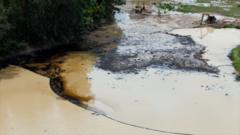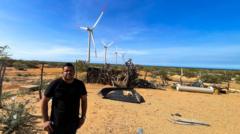Andrés Olarte, a whistleblower and ex-advisor to Ecopetrol's CEO, has leaked documents depicting over 800 instances of unresolved environmental impact caused by the company, which he claims was buried from the Colombian authorities.
Whistleblower Exposes Ecopetrol's Environmental Recklessness

Whistleblower Exposes Ecopetrol's Environmental Recklessness
In a shocking revelation, a former employee discloses the extensive oil pollution by Colombia's state-run Ecopetrol, raising questions of accountability.
Colombian energy company Ecopetrol faces serious allegations regarding its environmental record as whistleblower Andrés Olarte unveils extensive documentation of oil spills and pollution impacting waterways and biodiverse wetlands across the country. Documents shared by Olarte, who served as an adviser at Ecopetrol until 2019, contain more than 800 records from 1989 to 2018 indicating that the company failed to report at least one-fifth of these pollution incidents. The findings have raised alarms among local fishing communities, who assert that contamination has detrimental effects on the local wildlife, including endangered species.
Ecopetrol's main refinery, located in Barrancabermeja, lies along the banks of the Magdalena River—an essential water source for millions. Despite the company claiming adherence to Colombian law and sustainable practices, locals report substantial pollution, with iridescent films on water surfaces and fish smelling of crude oil.
Olarte's insider perspective reveals that he became aware of the severe environmental infringements soon after joining the company in 2017. According to him, he was discouraged from questioning these problems and was told that such inquiries were out of place for his role. Following his departure, he compiled and shared a substantial cache of data with both the Environmental Investigation Agency and the BBC, reinforcing the narrative of long-standing neglect by Ecopetrol regarding its environmental obligations.
While Ecopetrol's CEO during the period, Felipe Bayón, refuted claims of any systemic policy to hide pollution from authorities, he did mention that oil spills might be attributable to sabotage from armed groups, a common issue in Colombia's troubled landscape. However, data from Colombia's environmental regulator indicated that the frequency of spills has not declined post-2019, shedding doubt on the company's claims of improvement.
The environmental concerns are exacerbated by the threatening atmosphere surrounding those who challenge Ecopetrol, with both Olarte and local fisherwoman Yuly Velásquez receiving death threats linked to their activism. Velásquez detailed how threats intensified as she organized efforts to monitor and report on biodiversity in the wetlands, a region that has seen alarming levels of wildlife deaths potentially tied to oil pollution.
While Ecopetrol maintains a commitment to human rights and environmental responsibilities, experts caution about the potential for overlaps between security contractors—often former paramilitary members—and the companies they protect. Critics argue that the ecosystem and communities are caught in a precarious balance between economic development and environmental degradation.
In light of these developments, concerns about transparency, accountability, and the protection of environmental activists in Colombia continue to surface. As communities like Barrancabermeja grapple with the consequences of oil dependency, voices urging for clean energy transition—and justice for environmental wrongs—grow louder.




















